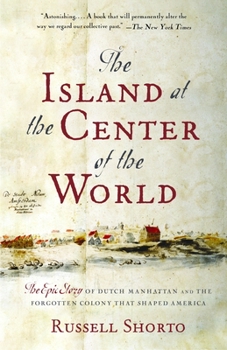The Island at the Center of the World: The Epic Story of Dutch Manhattan and the Forgotten Colony That Shaped America
Select Format
Select Condition 
Book Overview
In a riveting, groundbreaking narrative, Russell Shorto tells the story of New Netherland, the Dutch colony which pre-dated the Pilgrims and established ideals of tolerance and individual rights that shaped American history. Astonishing . . . A book that will permanently alter the way we regard our collective past. --The New York Times When the British wrested New Amsterdam from the Dutch in 1664, the truth about its thriving, polyglot society began to disappear into myths about an island purchased for 24 dollars and a cartoonish peg-legged governor. But the story of the Dutch colony of New Netherland was merely lost, not destroyed: 12,000 pages of its records-recently declared a national treasure-are now being translated. Russell Shorto draws on this remarkable archive in The Island at the Center of the World, which has been hailed by The New York Times as "a book that will permanently alter the way we regard our collective past." The Dutch colony pre-dated the "original" thirteen colonies, yet it seems strikingly familiar. Its capital was cosmopolitan and multi-ethnic, and its citizens valued free trade, individual rights, and religious freedom. Their champion was a progressive, young lawyer named Adriaen van der Donck, who emerges in these pages as a forgotten American patriot and whose political vision brought him into conflict with Peter Stuyvesant, the autocratic director of the Dutch colony. The struggle between these two strong-willed men laid the foundation for New York City and helped shape American culture. The Island at the Center of the World uncovers a lost world and offers a surprising new perspective on our own.
Format:Paperback
Language:English
ISBN:1400078679
ISBN13:9781400078677
Release Date:April 2005
Publisher:Vintage
Length:432 Pages
Weight:0.89 lbs.
Dimensions:0.8" x 5.3" x 7.9"
Customer Reviews
3 ratings
ISLAND AT THE CENTER OF THE WORLD
Published by Thriftbooks.com User , 19 years ago
THIS INCREDIBLE BOOK IS SO VERY WELL-WRITTEN AND BRINGS SOME NEWLY DISCOVERED HISTORY TO THE NEW YORK AREA. IT IS OUTSTANDING!
Fun, informative, provocative, well written
Published by Thriftbooks.com User , 20 years ago
I have lived in Manhattan for more than 30 years. But until I read this book, I assumed that the character of New York-commercial, contentious, tolerant, and multi-ethnic-was the product of European mass migrations starting, I suppose, with the Irish in the mid-nineteenth century. But, Shorto argues persuasively that this personality took hold much earlier. In fact, he shows how New York's character descends directly from the tolerant and litigious culture of the Dutch, a mighty commercial power in early 1600's, who founded a trading post and village on Manhattan in 1623. I, for one, am convinced. I also enjoyed this book for its resurrection of Peter Stuyvesant, who, to most New Yorkers, is simply the Dutch governor with a peg leg who retired to what is now the Lower East Side. Thankfully, Shorto fills out this picture and shows Stuyvesant as an autocrat who opposed democratic reforms. These bubbled up from the colony's earliest settlers, who believed such reforms might prevent the misrule that, in one case, lead to a bloody war with indigenous Americans. A good read and highly recommended.
A splendid and gripping book by a masterful writer
Published by Thriftbooks.com User , 20 years ago
Over the past few years, I've begun reading histories of Manhattan and this particular book is among the very best. It illuminates the hitherto shadowy world of the Dutch colony of New Netherland, and persuasively, vividly demonstrates the cultural debt we owe those early settlers. Perhaps most importantly, Russell Shorto infuses his story with suspense, humor, pathos and brilliant characterization. WOW! What a terrific writer!





